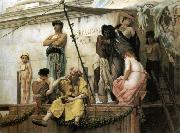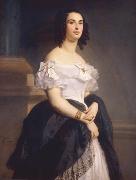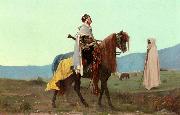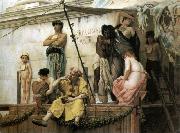Gustave Boulanger El petróleo que Pinta la ReproducciónAll Gustave Boulanger Oil Paintings(1824-88) was a French figure painter known for his Neo-Grec style. He was born at Paris, studied with Delaroche and Jollivet, and in 1849 took the Prix de Rome. His paintings are prime examples of academic art of the time, particularly history painting. Boulanger had visited Italy, Greece, and North Africa, and his paintings reflect his attention to culturally correct details and skill in rendering the female form. His works include a Moorish Cafe (1848), Cæsar at the Rubicon (1865), the Promenade in the Street of Tombs, Pompeii (1869), and The Slave Market (1888). The recipient of many medals, he became a member of the Institut de France in 1882. |
|||

|
|||
|
|
|||
|
||||||||
| Gustave Boulanger (1824-88) was a French figure painter known for his Neo-Grec style. He was born at Paris, studied with Delaroche and Jollivet, and in 1849 took the Prix de Rome. His paintings are prime examples of academic art of the time, particularly history painting. Boulanger had visited Italy, Greece, and North Africa, and his paintings reflect his attention to culturally correct details and skill in rendering the female form. His works include a Moorish Cafe (1848), Cæsar at the Rubicon (1865), the Promenade in the Street of Tombs, Pompeii (1869), and The Slave Market (1888). The recipient of many medals, he became a member of the Institut de France in 1882. |
||||||||
|
|
||||||||
| Pintura identificación:: 80705 Le marche aux esclaves - The Slave Market Painting entitled Le march aux esclave. The Slave Market, Oil on canvas Date before 1882(1882) cjr |
||||||||
|
|
||||||||
| Pintura identificación:: 80730 Portrait of Adele Hugo 1839(1839) Medium Oil on canvas Dimensions 116 x 90 cm (45.7 x 35.4 in) cyf |
||||||||
|
|
||||||||
| Pintura identificación:: 81977 An Arab Horseman Oil on canvas, 54 x 82 cm (21.3 x 32.3 in) Date 1865(1865) cyf |
||||||||
|
|
||||||||
| Pintura identificación:: 83677 Cest Un Emir Oil on canvas, 71 x 104 cm (28 x 40.9 in) Date 1870(1870) cyf |
||||||||
|
|
||||||||
| Pintura identificación:: 84896 Le march aux esclaves Date before 1882 cyf |
||||||||
|
|
||||||||
| ARTISTA PREVIO PROXIMO ARTISTA | ||||||||
|
|
||||||||
|
Gustave Boulanger (1824-88) was a French figure painter known for his Neo-Grec style. He was born at Paris, studied with Delaroche and Jollivet, and in 1849 took the Prix de Rome. His paintings are prime examples of academic art of the time, particularly history painting. Boulanger had visited Italy, Greece, and North Africa, and his paintings reflect his attention to culturally correct details and skill in rendering the female form. His works include a Moorish Cafe (1848), Cæsar at the Rubicon (1865), the Promenade in the Street of Tombs, Pompeii (1869), and The Slave Market (1888). The recipient of many medals, he became a member of the Institut de France in 1882. |
||||||||
|
|
||||||||
|
CONTACTE EEUU |










